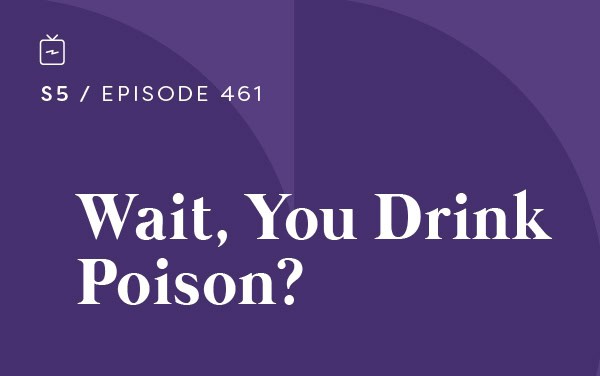
by Kris Oyen | Dec 18, 2023 | Podcast
Podcast: Play in new window | Download
Subscribe to the Recovery Elevator Podcast Apple Podcasts | | More
Episode 461 – Wait, You Drink Poison?
Today we have Gill. She’s 33 years old from Lexington, MA and took her last drink on November 9th, 2019.
Update from Ryan H on episode 457 – “I’m going on two weeks now and I’m definitely starting to notice a difference in my mood, digestive issues and weight.”
Registration for our intensive DRY January course RESTORE is now open! It’s time to get your alcohol-free connect on and say adios to the booze. The most common issue I hear is that people don’t have a network of others who don’t drink. Well, Our Restore is going to solve that and you’re going to learn a ton about alcohol, alcohol addiction, and how to beat it.
Better Help: www.betterhelp.com/elevator – 10% off your first month. #sponsored
[03:02] Intro:
Paul shares two Instagram accounts that will help you on your sobriety journey:
Drop the Bottle – all about sobriety and ditching the booze.
A.L.A.D.D.I.N – not about sobriety, but it is entertaining and when it’s creator shares his art with the world, it gives others permission to do the same.
Athletic Greens: https://www.athleticgreens.com/recovery
[08:22] Paul introduces Gill:
Gill is 33 and lives right outside of Boston, MA. She has a husband and a cat. She loves playing video games, going to concerts and travelling. She teaches chemistry courses and labs at a college in Boston. She is also the host of the Sober Powered podcast.
Gill says she didn’t start drinking until grad school. She didn’t have opportunities in high school because she was bullied and didn’t hang out with people that drank. She started because she feared that if she didn’t then no one would like her. Once she tried it a few times and got her first buzz, she enjoyed it so much it became a regular thing for her.
Gill started having repercussions from drinking early on. She didn’t know her limits, had frequent opportunities to drink and would end up getting sick and having blackouts. Gill thought all of this was normal and that everyone drank like her. Gill says that her performance in school started suffering and there was multiple drink fueled fights with her boyfriend (who is now her husband).
Gill ended up leaving program and decided to start teaching instead. She learned that drinking helped with the stress she experienced while teaching. Over time she switched from wine to vodka to save money. Her tolerance increased, and she started struggling with hangovers at work.
Trying to moderate and make rules around her drinking was frustrating for Gill. People didn’t want her to quit and when she would bring it up others would downplay it and tell her she was fine.
Gill’s depression was getting worse, and she started waking up with uncontrollable anxiety often. Once she began having suicidal thoughts, she got scared. Gill decided to take a break for 90 days to lower her tolerance and thought she would be cured. During that time her suicidal thoughts and anxiety lessened. She completed the 90 days and started drinking again and the consequences quickly followed.
After her last rule was compromised, she realized she had to accept that she had to let alcohol go indefinitely. While it was scary at first, Gill says she also felt a sense of peace.
Gill didn’t think she needed meetings when she first quit but doesn’t recommend people try to do it alone. After the pandemic started, Gill found she had the time to go to therapy, she started listening to podcasts, and doing a lot of research on the science around alcohol addictions. She wanted to share what she had learned with others, so she started her own podcast: Sober Powered.
Gill’s advice for the holidays: you don’t have to go to everything if you are worried that you’re going to drink or that you can’t stay sober, don’t go.
Gill’s go-to tool to get past a craving: walking, rage walking.
Instagram
Recovery Elevator YouTube
Sobriety Tracker iTunes
Recovery Elevator
I love you guys.
Go big because eventually we’ll all go home.
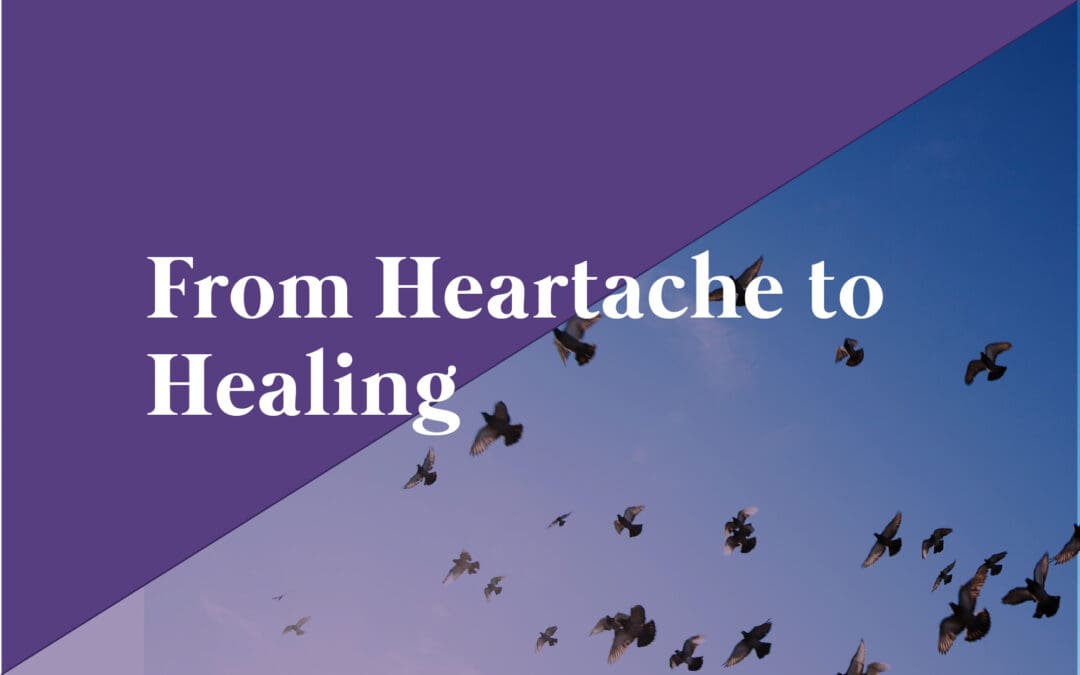
by RE Helper | Dec 15, 2023 | Alcohol Free, Blog, Early Sobriety, The first Year, Uncategorized
Today’s blog entry is from Adam Whitman. Adam has been a member of Café RE since September 2022. Adam has been alcohol free since January 1, 2023 and is very active within his Café RE OG community.
From Heartache to Healing
By: Adam Whitman (Café RE OG)
February 1st, 2023
My first month of sobriety is written in the books. 
The pink cloud is in full view and you better believe I’m right up in it. I take that back. I’m above it. Look at me soar. I’ve actually done it. I quit drinking. And you know, it isn’t that hard. Might I dare say it’s easy? I don’t even want to drink. It’s gross. I actually think it’s gross now.
I can’t hold back. I’m going to say it.
I am a freaking badass.
August 1st, 2023
My seventh month of sobriety is written in the books.
My negative thinking is out of control. Insecurities are running rampant. I no longer relate to my circle of friends. “I don’t like the new Adam” they say as I watch them slowly slip away.
And I’ve gotten fatter. What? Fatter? How the f**k did that happen?
I’m in the midst of the worst people pleasing flareup of my life. My marriage is hanging on by a thread. The woman who I’ve shared 22 years of my life with, who I’ve raised two beautiful children with, is tired. We’re both tired. And I’m not sure we can hold on much longer.
I can’t hold back. I’m going to say it.
I am a freaking mess.
August 5th, 2023
Today I set sail to the RE Bozeman Retreat. I’m driving. Yes, you heard me right. This Texas boy is driving to Montana–3,200 miles round trip. Let’s do this.
But wait a second. Was I really talking about splitting assets with my wife yesterday? Were we really talking about how we would manage custody of our children? What the hell is going on?
Maybe I shouldn’t go. But right now, Bozeman seems to be the only answer. As to what the question is, I have no idea. One thing remains certain.
My life is a wreck.
Trinidad Lake State Park
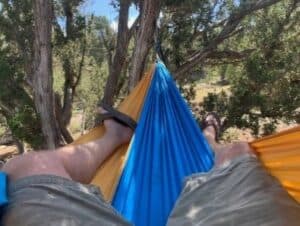 Eight hours to Trinidad, Colorado complete.
Eight hours to Trinidad, Colorado complete.
The tent is up and I’m resting easy in my hammock. Look at me go. I can do this alone. I don’t need anyone. In fact, being alone is better. I am one strong dude. Back and forth my hammock swings between two trees until the sun goes down and the darkness sets in.
I’m lonely.
And afraid.
Did she really say she would leave me?
Quitting drinking uncovered some shit, didn’t it? I can’t get these thoughts out of my head. Who imagined it would be a good idea to venture out into the world alone in a tent for three days? Why am I such a mess? Will I ever get better? Will I be able to stop thinking about her? About me? About all of the shame and regret?
Sun, you can come up now.
 August 6th, 2023
August 6th, 2023
Glendo State Park
Six hours to Glendo, Wyoming complete.
My tent is pitched. It appears as if I’m the only person in this park. Rain starts to fall.
The negative thoughts continue to flood my mind. In addition, the solitude is proving that I really annoy myself. What does that even mean? I annoy myself? Is this what it’s like for others to be around me?
The thoughts continue to relentlessly take over. But within the constant bombardment of negative thinking a new softly spoken response starts to emerge.
Tell the thoughts to stop.
But I can’t.
Yes, you can. Quiet them. Just try it.
Adam, you’ve hurt people. Shh… Adam, you’re not doing enough. Shh… Adam, you’re worthless. Shh… Adam, you’re a failure. Shh… Over and over, like a broken record. Shh…. Enough.
Did drinking cause this madness? No. It hid it though, buried it deep. And now it’s here crawling out of the dark threatening me, whispering lies. I keep telling it to shut the hell up. But will it listen?
Persistence remains.
Time will tell.
August 7th, 2023
Grandview RV Park
Five hours to Hardin, Montana complete.
I chose an RV park this time, laundry and a hot shower, and people too. It’s been awhile. They distract me. This is good. The sunset is beautiful. I order a pizza and rest.
Tomorrow I will be in Bozeman. There I will finally be in the physical presence of my Recovery Elevator friend Jim. We initially met at the REstore Dry January course, the course where my journey towards enlightenment started, where the ups and downs of sobriety began. And Jim held onto me throughout.
If you know Jim that shouldn’t surprise you.
August 8th, 2023
Days Inn Bozeman
Four hours to Bozeman Montana complete.
It’s my first night out of a tent and in a motel. Jim is staying here too. I’m nervous.
After a couple of hours, we meet for dinner. During our introduction a firm handshake occurs followed by an awkward jump as if we both stuck our fingers in a light socket. It’s the ‘should I go in for a hug but then suddenly decide against it’ jump. Solid handshake though Mr. Jim.
I’m glad to finally meet you.
You’ve been a dear friend.
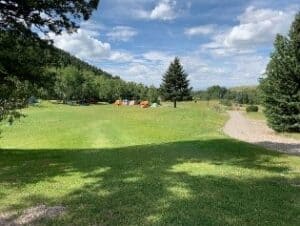 August 9th, 2023
August 9th, 2023
Thirty minutes to Big Sky, Montana complete.
No turning back now.
Jim and I arrive at the retreat. I unpack my gear and set up my home for the next four days. It’s beautiful out here. Once my tent is ready I walk to the registration area. It quickly becomes apparent that many of these retreat goers already know each other.
What if they don’t like me? I am just a middle-aged dude with issues who somehow made his way far from home. Ain’t nothing special about me. Heck, I don’t even know if I like me.
The voices persist.
Maybe I’ll just stand here and pretend I’m feeling confident. Keep your hands out of your pockets Adam. Be cool man. Be cool.
But It didn’t take long before it happened. One, after another, after another approached me. “Where are you from?” they would ask. “You drove here?” “That’s so cool!” “Do you have a family?” “What are their names?”
My God they are so kind. Are all of them like this? Soon I realized that yes, they are. I wondered why. By the end of our time together I found the answer.
It’s because we all share in each other’s unavoidable suffering.
I used to think I could drown that suffering with booze, repress it somehow, maybe even eliminate it, alone. But as you might have guessed it never worked. It only made it worse.
Instead, in the presence of others working their recovery in the stunning landscape of Big Sky Montana, I dared to expose my suffering. I didn’t fight it, I didn’t hide it, I didn’t drown it, I shared it. And they shared theirs with me. And it was beautiful.
Connection is the opposite of addiction and I get it now.
I am here.
I am whole.
Finally.
August 23rd, 2023
My reentry home was purposely slow. I took my 
new-found freedom into the Utah desert first, then back up
into western Colorado to meet my Recovery Elevator
accountability partner, and finally back to the unbearable
Texas heat.
Everything’s changed.
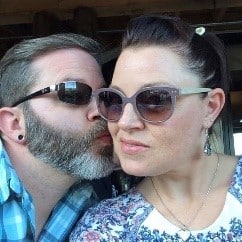 I missed her.
I missed her.
And come to find out, she missed me.
Today was our first day of marriage counseling.
I’m hopeful.
The negative voices, they’re still there. But they’re quieting, fading. Why? Because I have recovery tools to work with now.
And I have friends.

by Kris Oyen | Dec 11, 2023 | Podcast
Podcast: Play in new window | Download
Subscribe to the Recovery Elevator Podcast Apple Podcasts | | More
Episode 460 – The Friends We Keep
Today we have Kerry. She’s 40 years old from Williston, ND and took her last drink on January 7th, 2016.
Shoutout to our Café RE chat hosts! Thank you for your dedication to the community, and for providing a space for us to share our experiences. You’re the best!
Exact Nature: https://exactnature.com/RE20
[01:29] Highlights from Kris:
It’s important that we surround ourselves with people who are going to enrich our lives. People who will meet us where we are, but also challenge us and encourage us to grow.
Kris shares some examples of great friends he has in his life and shares an article that outlines Five Types of Friends – friends we need and need to be.
Take a look at the people you have in your life. Do you think you have someone that fits in each of these categories? When was the last time you let them know what they mean to you? Use this as a reminder to tell someone you love them, and that you’re grateful for them.
If you find yourself today, feeling like YOU’RE alone, I promise you that you’re not. You’re people are out there.
Better Help: www.betterhelp.com/elevator – 10% off your first month. #sponsored
[10:15] Kris introduces Kerry:
Kerry and her partner live in Williston, ND and are raising four kids. She recently decided she was going to become a firefighter which stemmed from being an EMT and a nurse. She enjoys spending time with the kids and they are currently rebuilding a boat.
Kerry was exposed to alcohol throughout her childhood but didn’t really have any great interest in it. She feels that she was a people pleaser and didn’t want to get in trouble until senior year when she decided she could let loose and have some fun before going to college. She found alcohol gave her relief from the stressors in her life.
Going into college she and her friends were party seekers. She had excelled so much academically that she felt she could relax and have fun and not worry about responsibilities. Her idea of an addict was her dad who wasn’t obvious about it. She didn’t have the consequences he did so she didn’t feel she had any problems. When she was 19 her parents put her into rehab because of drug use. While she was there the counselors recognized that her bigger issue was drinking. Kerry didn’t listen and continued to drink after leaving treatment.
Kerry’s parents got a divorce and she had moved back home. She used any excuse to drink to not deal with things. She was having consequences like DUIs and broken relationships. At the time Kerry was working with her mom at a family business where happy hours and daily drinking after work were part of the daily landscape.
Looking for a change, Kerry a boyfriend moved to Alaska and started a family. The drinking slowed down, but after that relationship ended and they shared custody of the kids, Kerry found herself going back to drinking.
After moving back to North Dakota, she continued to use drinking to self-medicate. People didn’t realize it because she was so good at taking care of other people and being a problem solver. Over time the drinking was getting heavier and heavier, and Kerry tried to create parameters to control it.
She tried quitting for a while but when she tested the waters again, she had consequences including another DUI where she realized she needed to get help to quit completely. She joined Lion Rock Recovery, which was all online, so she didn’t need to leave her family for treatment. It helped her focus on the reason she drank and deal with her mental health and gave her tools to use after the program ended.
Kerry’s plan in recovery moving forward: keep learning, keep doing crazy things like firefighting and getting more involved with recovery service.
Kerry’s parting piece of guidance: there isn’t a roadmap, and if one thing doesn’t work, you can try another.
Instagram
Recovery Elevator YouTube
Sobriety Tracker iTunes
Recovery Elevator
We are the only ones that can do this RE, but we don’t have to do it alone.
I love you guys.
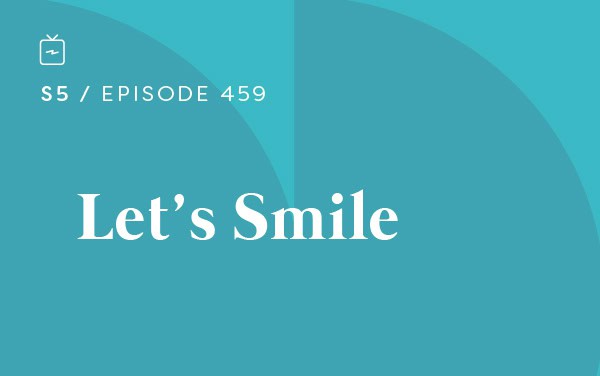
by Kris Oyen | Dec 4, 2023 | Podcast
Podcast: Play in new window | Download
Subscribe to the Recovery Elevator Podcast Apple Podcasts | | More
Episode 459 – Let’s Smile
Today we have Spencer. He’s 44 years old from Minneapolis, MN and took his last drink on September 23rd, 2023.
Registration for RESTORE is no open! If you want to take a break for a month, or say adios for good, this course is for you. You’re going to learn all about alcohol addiction, what it is, what it isn’t, how to beat cravings, you’ll learn about many different recovery pathways, and the best part is you won’t be doing this alone.
Exact Nature: https://exactnature.com/RE20
[02:04] Highlights from Paul:
Start your day with a smile. It doesn’t matter if the smile is fake or real. The body doesn’t know the difference and the nervous system always responds positively with a smile.
Smiling increases mood-enhancing hormones. Smiling releases endorphins, natural painkillers, and serotonin, while decreasing stress-enhancing hormones, including cortisol, and adrenaline. It also reduces overall blood pressure.
Another reason to smile is that research shows that smiles are contagious. Most people will find a way to reciprocate in a friendly manner. Smiling is a way to be of service because it makes other people’s days better.
Spiritual teacher Thich Nhat Hanh has said “Sometimes your joy is the source of your smile, but sometimes your smile can be the source of your joy.”
Start your day with a 30 -second smile. And not for just one day or two,
but rock that smile every morning for the rest of this year and hopefully beyond. And don’t forget to keep that smile going throughout the day.
Paul shares some dad jokes to help get us started.
Better Help: www.betterhelp.com/elevator – 10% off your first month. #sponsored
[08:04] Paul introduces Spencer:
Spencer grew up in Minneapolis area. He is married with two kids. He enjoys playing blues and rock on his guitar and spending time on the river with his family. Spencer has been an electrician for 23 years.
Spencer says that alcohol was a big part of his family’s life while he was growing up. Both of his parents drank, and every event was centered around alcohol. Spencer didn’t try alcohol until he was around 15. He had a friend who’s parent worked nights, so their house became a party house and drinking happened frequently.
Spencer got married young and they both drank heavily. They had a daughter together and eventually they ended up getting a divorce. At the time Spencer blamed a lot of the issues on his ex. Once she moved out Spencer had some friends move in and says the drinking became daily and he was losing jobs. He eventually started having financial issues and lost his house.
It was shortly after he started dating a woman that didn’t drink like him that he realized that drinking might be a problem for him. He didn’t really make any changes until the birth of his son when he began to try moderating and added rules around his drinking.
Things were going well for Spencer and then he got a call from his son’s mother that she was a heroin addict. He ended up having to get custody of him and knew he had to stop drinking for his son. He was able to quit for a while but gradually let drinking slip back in.
Spencer was able to quit for a few years and started recognizing how big of an issue alcohol had been for him. He knew he wanted to quit but wasn’t sure how he was going to be able to do it.
New activities have replaced drinking for Spencer. He is working on his relationships with his kids and has been talking to them about alcohol and the issues within the family. Spencer is open about his sobriety with others. He listens to a lot of podcasts about addiction and enjoys online AA meetings and has plans to do the steps. Spencer knows how important connection will be going forward.
Spencer’s parting piece of guidance: If you think you have a problem, find someone that’s sober to talk about it, listen to podcasts, get connected.
Instagram
Recovery Elevator YouTube
Sobriety Tracker iTunes
Recovery Elevator
Remember Rule 22, keep those smiles going. Lighten up.
I love you guys.
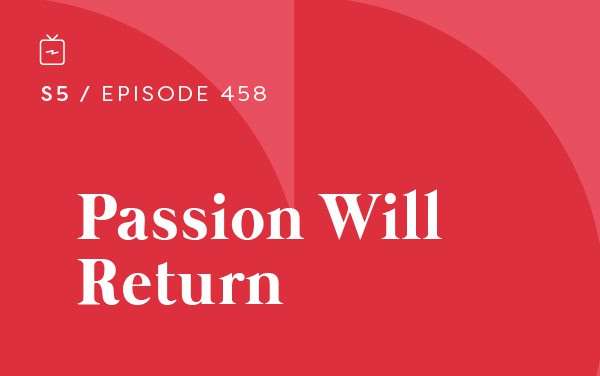
by Kris Oyen | Nov 27, 2023 | Podcast
Podcast: Play in new window | Download
Subscribe to the Recovery Elevator Podcast Apple Podcasts | | More
Episode 458 – A Big Win
Today we have Mike. He is 44 from Huntsville, AL and took his last drink on April 10th, 2023.
Registration for RESTORE opens this Friday! If you want to take a break for a month, or say adios for good, this course is for you. You’re going to learn all about alcohol addiction, what it is, what it isn’t, how to beat cravings, you’ll learn about many different recovery pathways, and the best part is you won’t be doing this alone.
Exact Nature: https://exactnature.com/RE20
[02:42] Highlights from Paul:
Paul shares how releasing his first album is a huge win for him and that the listeners are a big part of making it happen.
Something commonly heard when people quit drinking is “what is going to fill the void?”.
We have to rediscover likes and interests. Part of the journey is trying out new hobbies. Sometimes it takes a while to find out what we like to do though, so be patient with your healing.
If you want to hear the outro song and the full album under the name of Pablo Church, you can check it out on Spotify, or search your preferred music streaming service.
What dreams, goals, aspirations, did you have that alcohol stifled like a wet soggy blanket. What did alcohol bump down on your list of personal goals? What do you want in life now that alcohol is no longer in the front seat? Take a moment to ponder these questions, maybe hit pause in this episode, put pen to paper and get clear on what you want. Paul and the RE community are here to help you make it happen.
Better Help: www.betterhelp.com/elevator – 10% off your first month. #sponsored
[07:18] Kris introduces Mike:
Mike lives in Huntsville, AL and works in construction. He is married and they have five kids. He enjoys attending his kids’ sporting events and being outside and active.
Mike grew up in a conservative home. His father had a history of rebellion and his mother lost both parents to alcoholism when she was young, so they chose to keep alcohol out of the home.
Mike first tried alcohol on New Year’s Eve when he was in 8th grade while at a friend’s house. He started to associate alcohol with having a good time but didn’t drink much during high school even though his friends did. Mike was a people pleaser both at home and with his friends. He feels this tendency drove him to start drinking and smoking pot to fit in with everyone.
Mike went to one semester of college and decided it wasn’t for him. After some consequences from his drinking, he ended up moving back home and working construction. He was still drinking and smoking but trying to make better choices.
When Mike met his wife, they decided to make some changes. They quit drinking and smoking and started becoming more active in the church community. When the job market started changing in Michigan, they moved to Alabama where Mike was offered a new job.
After a while, Mike decided to quit his job and start his own construction business. That was going well but Mike found that managing the business instead of doing the labor was very different and more stressful. As time when on his drinking gradually increased and since everyone else was drinking, he could justify it. Over time he was drinking before, during and after work. His wife discovered the stash in his office and that’s when Mike said he would quit. For a few months, he found himself hiding his drinking and trying to drink less, which didn’t work.
Mike eventually sought outpatient treatment and tried that for a while before his counselor told him he had to do more. Mike was resistant to trying AA but once he did he was able to start making some changes and getting help to stay sober.
Mike’s plan in sobriety moving forward: to make the most of the time he has left.
Mike’s parting piece of guidance: today is just a day and time takes time.
Instagram – We regularly feature content here.
Recovery Elevator YouTube
Sobriety Tracker iTunes
Recovery Elevator
You’re the only one that can do this, but you don’t have to do it alone.
I love you guys.




 Eight hours to Trinidad, Colorado complete.
Eight hours to Trinidad, Colorado complete.  August 6th, 2023
August 6th, 2023
 August 9th, 2023
August 9th, 2023
 I missed her.
I missed her.



